Descarga la gacetilla en .pdf Gacetilla de prensa Inauguración Catedra UNESCO _ 29 11 2022
GACETILLA DE PRENSA
SE LLEVÓ A CABO LA INAUGURACIÓN DE LA CATEDRA UNESCO
EN “SISTEMAS ECONÓMICOS Y DDHH” DE LA UNLP
ES
En el día 29 de noviembre 2002, en la sede de la Universidad Nacional de La Plata del edificio Karacachoff, se llevó a cabo la ceremonia inaugural de la Catedra UNESCO en “Sistemas económicos y Derechos Humanos”. Un proyecto que integra más de 20 Universidades de todo el mundo y que representa un verdadero desafío para la UNLP, para construir y promover un pensamiento económico que sepa conjugar la economía con la promoción los Derechos Humanos como fundamento del bienestar de los pueblos y de nuestras democracias.
De la ceremonia participaron las Autoridades de la UNLP, el Presidente Martín López Armengol, Javier Mor Roig, Secretario de Relaciones Institucionales, Verónica Cruz, Secretaria de Derechos Humanos y el Director de la Cátedra, Francesco Vigliarolo. Todos destacaron la importancia de tener la Catedra UNESCO para la Universidad.
El Secretario de Relaciones Institucionales subrayó el rol del conocimiento universitario para transformar la sociedad y como esta Catedra responde perfectamente a este tipo de demanda.
El Presidente, cerrando los saludos, agradeciendo también a la UNESCO, recordó como la Universidad de La Plata tiene en su ADN estas temáticas y como la Cátedra está en perfecta sintonía con los desafíos que la UNLP lleva adelante hace muchos años.
Se leyeron también los saludos del Secretario de Derechos Humanos del Ministerio de Justicia y Derechos Humanos de Nación, Horacio Pietragalla Corti, y del Ministro de la Dirección de Organismos Internacionales Ministerio de Relaciones Exteriores, Comercio Internacional y Culto, Eduardo A. Almirantearena, que expresaron ambos, mucho interés en la iniciativa y dieron su disponibilidad en colaborar.
A continuación, se asistió a las interesantes lectio magistralis de Stefano Zamagni, Economista de fama mundial y Presidente de la Pontificia Academia Vaticana y Adolfo Perez Esquivel, Premio Nobel de la Paz 1980. Ambos trataron el tema “La economía como construcción de derechos: desafíos y límites de nuestros tiempos”.
Zamagni puso sobre la mesa diferentes problemas, como las tensiones entre trabajo justo y trabajo decente, democracia y economía de mercado, los problemas inducidos por la finanza especulativa y el rol de las instituciones mundiales inadecuadas porque creadas en un mundo que no es ya el mismo. En este contexto, propuso algunas salidas como el cambio de las reglas del juego o volver a ser responsable en el sentido de hacerse cargo de los problemas que vivimos para concluir lanzando un desafío a la misma Catedra, el de trabajar para saber conjugar el pluralismo cultural con un núcleo de valores comunes necesario para que una sociedad pueda vivir.
Esquivel, subrayando las dificultades de tratar el tema economía y DDHH, porque afirma que hoy estas áreas son contrapuestas, describe a los economistas dominantes como los nuevos alquimistas de la edad media que mezclan varios factores solamente para crear riqueza, pero no bienestar. Nos invita a reconsiderar la palabra desarrollo y a usar la palabra equilibrio, con sí mismos, con los demás y con la naturaleza. Pone, también, énfasis sobre el respecto de las diferencias, de todos los individuos hoy tratados como números por los sistemas económicos.
Finalmente, Vigliarolo, luego de haber agradecido a la UNESCO y a la Universidad por esta importante oportunidad, presentó la Catedra a partir de las bases teóricas que subyacen a su creación, entre ellas, los límites del positivismo económico. Expuso los objetivos, las actividades y subrayó algunos ejes de trabajo previstos como lo de transformar las periferias en centros.
Después del debate con algunos integrantes de la Red se dio por terminada la jornada con el auspicio de seguir trabajando de manera conjunta y pluralista.
EN
On November 29, 2002, at the National University of La Plata in the Karacachoff building, the inaugural ceremony of the UNESCO Chair in “Economic Systems and Human Rights” was held. A project that integrates more than 20 universities around the world and that represents a real challenge for the UNLP, in order to build and promote an economic thought that combines the economy with the promotion of Human Rights as the foundation of the well-being of the peoples and our democracies.
The UNLP Authorities, President Martín López Armengol, Javier Mor Roig, Secretary of Institutional Relations, Verónica Cruz, Secretary of Human Rights and the Director of the Chair, Francesco Vigliarolo, participated in the ceremony. All highlighted the importance of having the UNESCO Chair for the University.
The Secretary for Institutional Relations underlined the role of university knowledge in transforming society and how this Chair perfectly responds to this type of demand.
The President, closing the greetings, also thanking UNESCO, recalled how the University of La Plata has these issues in its DNA and how the Chair is in perfect harmony with the challenges that the UNLP has been carrying out for many years.
The greetings of the Secretary for Human Rights of the Ministry of Justice and Human Rights of the Nation, Horacio Pietragalla Corti, and the Minister of the Directorate of International Organizations Ministry of Foreign Affairs, International Trade and Worship, Eduardo A. Almirantearena, were also read, who expressed both had a lot of interest in the initiative and gave their availability to collaborate.
Next, they attended interesting lectio magistralis by Stefano Zamagni, world-renowned economist and President of the Pontifical Vatican Academy, and Adolfo Perez Esquivel, Nobel Peace Prize Winner in 1980. Both dealt with the theme “The economy as a construction of rights: challenges and limits of our times”.
Zamagni put different problems on the table, such as the tensions between fair work and decent work, democracy and the market economy, the problems induced by speculative finance and the role of inadequate world institutions because they were created in a world that is no longer the same. In this context, he proposed some solutions such as changing the rules of the game or returning to being responsible, in the sense of taking charge of the problems we are experiencing to conclude by launching a challenge to the Chair itself, that of working to know how to combine cultural pluralism with a core of common values necessary for a society to live.
Esquivel, underlining the difficulties of dealing with the economy and human rights, because he affirms that today these areas are opposed. He describes the dominant economists as the new alchemists of the Middle Ages who mix various factors only to create wealth, but not well-being. He invites us to reconsider the word development and to use the word equilibrium, with themselves, with the others and with the nature. He also places emphasis on the respect of the differences, of all the individuals today treated as numbers by the economic systems.
Finally, Vigliarolo, after having thanked UNESCO and the University for this important opportunity, presented the Chair based on the theoretical bases underlying its creation, including the limits of economic positivism. He exposed the objectives, the activities and underlined some axes such as transforming the peripheries into centers.
After the debate with some members of the Network, the day ended with the auspices of continuing to work jointly and in a pluralistically way.
Algunas fotos del evento/Some photos of te event
Mesa inicial completa Verónica Cruz y Adolfo Pérez Esquivel
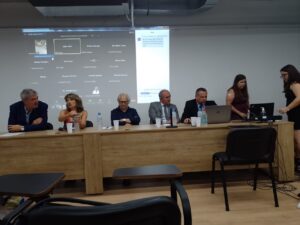
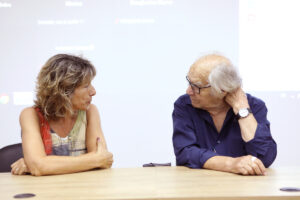
Adolfo Pérez Esquivel Adolfo Pérez Esquivel y el Presidente Martín López Armengol
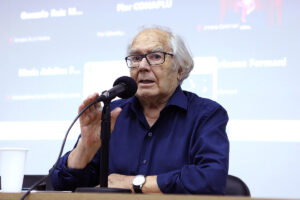

Javier Mor Roig, Adolfo Pérez Esquivel
y el Presidente, Martín López Armengol Javier Mor Roig
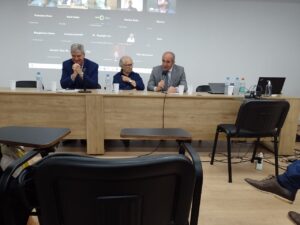
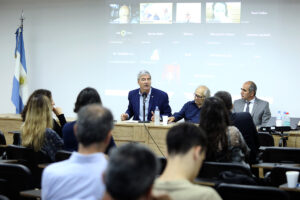
Stefano Zamagni
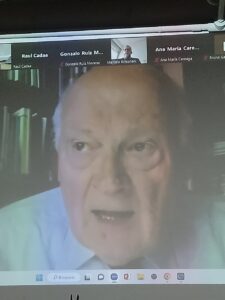
Francesco Vigliarolo y Adolfo Pérez Esquivel Francesco Vigliarolo y los participantes vía zoom
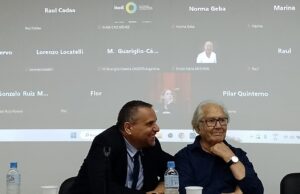
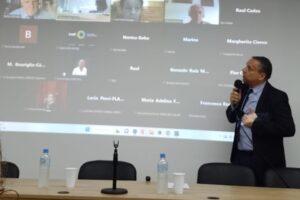
Natacha Chantal Guiñazú y
María Ruiz del Castillo, equipo organizativo

